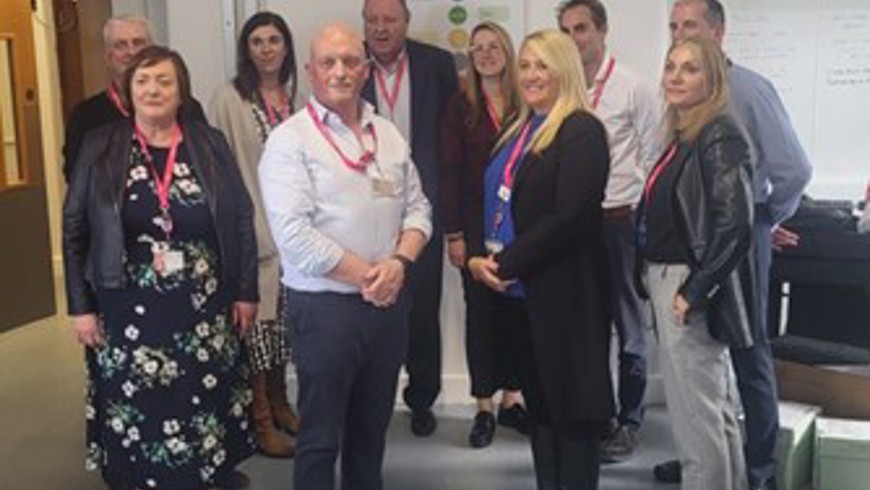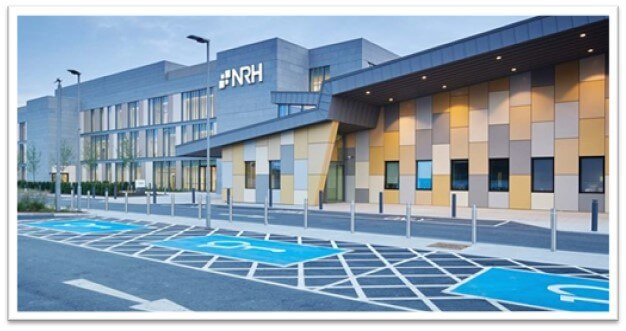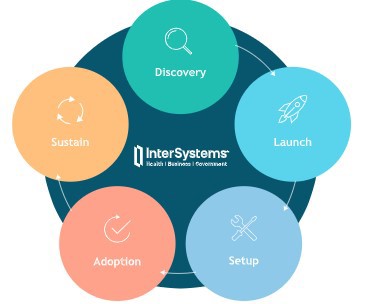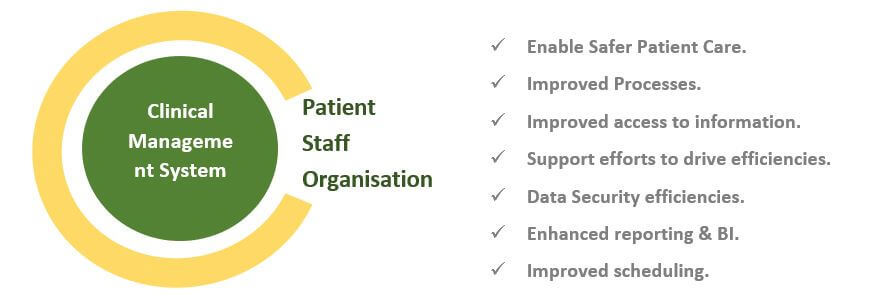
Clinical Management System(CMS)
Go-Live for National Rehabilitation Hospital (NRH)
Following on from the successful National Forensics Mental Health Service (NFMHS) go-live in the October newsletter, we are pleased to announce that the National Rehabilitation Hospital (NRH) in partnership with eHealth and the vendor Intersystem have completed their phased go live implementation of a Clinical Management System (TrakCare) across the NRH Campus.
Working in coordination with the eHealth Specialised Care Services -Clinical Management System (SCSCMS) Team and the CMS vendor, the Patient Administration System (PAS) successfully went live in May 2023. This was closely followed with the Go-Live of the Clinical modules which encompasses Clinical Questionnaires & Documents, and Order Communications in October 2023, and Electronic Prescribing Medical Administration (ePMA), Go-Live being completed in December 2023. It is a fantastic achievement, and we would like to take this opportunity to congratulate all involved, including the NRH Project Fusion Team responsible for the delivery and adoption of the TrakCare implementation project within the SCS-CMS eHealth programme team and the CMS vendor Intersystem. The Journey to a Clinical Management System (CMS) Background to clinical systems in the National Rehabilitation Hospital: The NRH delivers a range of complex rehabilitation services across inpatient, outpatient and day settings as well as operating community liaison services which intersects across multiple settings. Traditionally the NRH clinical and administrative processes were largely manual, and paper based, with some standalone non-integrated ICT systems in operation.
A programme of work was undertaken to provide an ICT landscape that could offer new digital health services that would ultimately deliver:
- Daily benefits for patient care.
- Align clinician staff time to patients rather than administrative tasks.
- Create a digitally enabled and connected workforce.
- Allow patients as empowered partners.
- Ensure digitally informed services.
- Ensure collaboration on patient care.
- Build on a digitally secure foundation.

It is noted from NRH in 2018:
The vision for this project is to harness the benefits of eHealth to enhance the delivery of rehabilitation within the new NRH campus, as well as to influence and contribute to change across the wider rehabilitation and Irish health ecosystem.
Drivers for Change
New Beginnings: NRH’s new hospital building completed in 2020 provided a driver for ICT structural change, optimising the potential for improved and integrated patient care.
Access: Providing clinicians with electronic access to comprehensive health care records at the point of care that include clinical data from multiple sources and across interdisciplinary episodes of care. Enabling decision makers and researchers to access large amounts of patient non identifiable clinical data.
Footprint: A NRH CMS was critical to reduce the time for staff to travel in order to record and access patient information in centrally held paper charts.
Information Governance: Optimisation of the administrative value of the CMS would enable the development of consolidated approaches to information governance.
Response to Crisis: Ensuring patients and families can connect digitally, can communicate with relevant health care professionals, and be kept informed with their most up-to-date information had come into sharp focus due to COVID-19 visiting restrictions.
Connecting Information: Connecting the transfer of information between acute rehabilitation clinicians nationally and NRH staff.
Project Methodology
The project followed the ARIES methodology vendor approach as illustrated below. A dedicated CMS Project team for NRH was established to work in partnership with the eHealth SCSCMS Programme Team and the vendor.

At each phase the teams worked to complete the deliverables of each stage. Work streams were formed with work leads assigned from the SCS-CMS Programme Team, NRH and Intersystem. The agile methodology of SCRUM was used, with sprint planning embedded to facilitate the solution design work. The SCS-CMS Programme also embedded traditional waterfall approaches of project delivery and ensured appropriate oversight and governance was in place at each stage.
Working Collaboratively
An eHealth Senior Project Manager was assigned to NRH to work for the duration of the project and provided expert guidance and direction to the site. Expertise, assurance, oversight, and hands on support was provided by the SCS-CMS Programme team across twelve work streams. The Community eHealth Delivery Director chaired the Programme Oversight Group navigating through all stages of the project. The eHealth SCS–CMS team collaborated with NRH for the duration of this project and provided key expertise in areas such as, clinical documentation, ePMA, data migration and interface development for example working on behalf of NRH with our eHealth A2I colleagues for IHI and Eircode integration with NRH being the first Section 38 hospital with IHI integration. The SCS-CMS team were assigned as an eHealth Lead for work streams and worked closely with the site lead to deliver the required outputs.
Benefits of a Clinical Management System for NRH
Some of the key benefits anticipated for NRH:
Patient
- Supporting clinical decision making by providing the patient information in real time at the point care.
- Enables safer patient care with increased capability to monitor and review medication management processes.
- Improved Patient Experience facilitating collaboration between users involved in contributing to patient goal setting.
- Through the digitisation of data entry NRH have an increased ability to ensure completeness, consistency, and legibility of clinical information.
Staff
- Improved ability for staff to focus on patient care with real time access to consolidated information and specialised clinical expertise at the point of care, anywhere, at any time.
- Improved scheduling efficiencies
- Supports efforts to drive efficiencies to focus on clinical care rather than administrative tasks.
- Improves co-ordination of processes across the patient journey at clinical, administrative and management levels.
- Improved staff confidence accessing and capturing patient record information digitally.

Organisation
- Support for achievement of strategic objectives set out in the NRH strategy 2020-2023.
- Capture of KPIs required by National Rehabilitation Medicine Programme (NRMP).
- Establishes paper-late practices - by reducing paper requirements for clinical and administrative purposes.
- Capture of KPIs required by National Rehabilitation Medicine Programme (NRMP).
- Improved opportunities for quality improvement (QI) initiatives and research, and more detailed information available for research activity.
Adoption Trends post go live
Significant work went into processes and standards to ensure the best outcome for NRH patients. The NRH recognises Interdisciplinary (IDT) working as the most effective way of delivering person centred care. This bespoke approach and tailoring of the system ensures quality ways of working through digitisation and the delivery of the best care to patients. The system has been built to provide efficient and effective working practices for staff and to enhance how care is delivered to patients while upholding the core values of NRH.
Acknowledgements
We wish to acknowledge the work and effort that went into making this possible. The vision to transition from legacy based systems and manual processes to digitally enabled healthcare could not have happened without the dedication and effort of the National Rehabilitation organisation and Project Fusion Team, the eHealth Community (SCS-CMS) and eHealth Community Colleagues, and TrakCare CMS Team Intersystem. We also wish to acknowledge the contributions made in this journey by wider eHealth and HSE teams from colleagues in Procurement, A2I, Data Protection, Finance, PMO, Tech Office, and Business Operations, and to the eHealth Senior Management Team who all assisted in making this transformation possible. The SCS-CMS Programme Team is very proud of what has been delivered for patient care in NRH and the benefit for patients, families and staff this transformation will deliver for years to come.
For more information on the eHealth SCSCMS Programme please click here.
If you have any queries on the SCS-CMS programme please contact scs.cms@hse.
